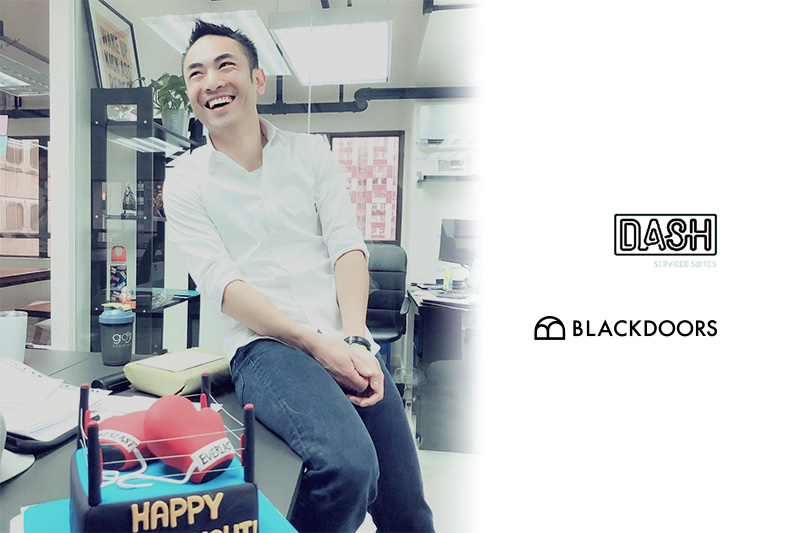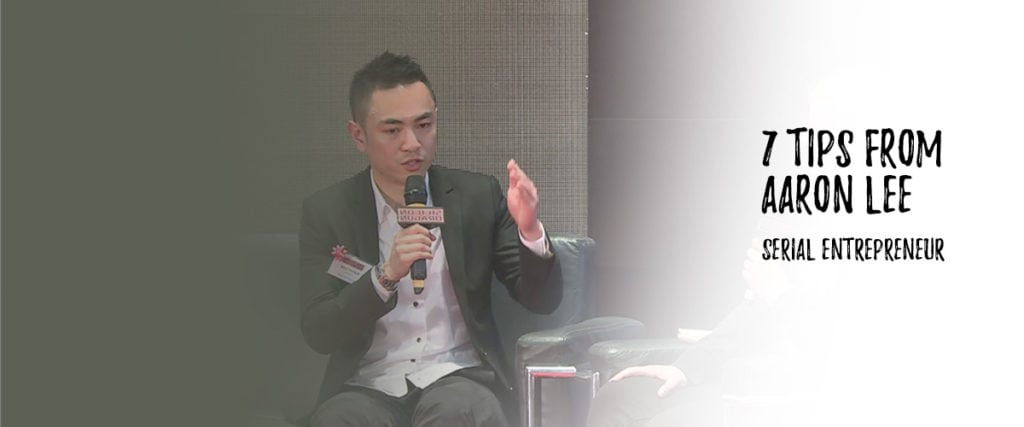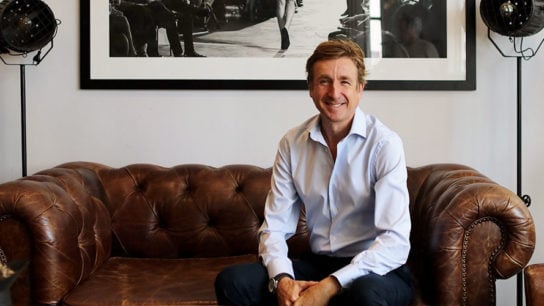Featured in Forbes’s 30 under 30 in 2016, angel investor Aaron Lee is no stranger to the startup scene. The founder of seven enterprises in 15 years, he is now teaching young entrepreneurs how to achieve business success in Asia.
An angel investor and seven-time founder who began his first business at 17, Aaron Lee continually strives to solve problems with technology. Unafraid of challenging the status quo, this is a man who has successfully garnered traction in every industry he has dabbled in – take his e-commerce site Ubuyibuy, for example, which was sold to Groupon within a short six months, making him the youngest Head of Groupon Hong Kong at the age of just 22.
Currently, he has his eye on several innovative ventures: Time Auction – a philanthropic platform trading volunteer hours for mentorship and expertise, education-app Snapask, and fashion enterprises MyDress and Extravaganza. And his newest personal focus? Re-inventing Hong Kong’s strained property market to accommodate premium but affordable co-living spaces in central locations with DASH and BlackDoors, his nascent asset-light, community-driven hospitality empire across Hong Kong.

“It really boils down to solving big problems in the market to improve people’s lives in a positive and scalable way,” he says of his approach. “That’s my entrepreneurial purpose.” This month, Aaron sat down with the Hive Life team to offer his hard-earned wisdom to budding entrepreneurs.
Tip #1
Finding Investors For Early-Stage Startups
Whether you’re designing your first prototype or expanding market reach, there is one simple truth that applies to all early-stage startups: you need capital.
“You have to be out there,
whether that’s networking, giving back,
or just doing business.”
Drawing from his experience as an angel investor, Aaron is clear that certain types of funding are easier to secure than others. “If you want a large amount of funding, you really need to have solid traction, a solid team and solid scalability,” he relates. “But if you’re looking for seed funding, there’s friends or family, or angels. I wouldn’t say it’s easy getting funding for anybody, but there are a lot of individual investors like myself looking for deals. You just have to get out there and meet as many people as possible to find them.”
Engaging with investors on a personal level is crucial. “Your angel investor isn’t going to decide to invest at some board somewhere. You have to be out there, whether that’s networking, giving back, or just doing business,” he explains.
And, when it comes to closing the deal, money shouldn’t be the only consideration either. “I would think about strategic value more than money in the early days,” Aaron advises. “Even if it’s a bad deal, this person can help you grow, whether it’s through their connections, mentorship, or previous experience. Don’t let someone come in just for money. You will regret that in the long run.”
Tip #2
Mentorship: Supporting Young Entrepreneurs
Often an overlooked subject, mentorship is crucial to ensuring young entrepreneurs are given the guidance and support they need to succeed.
“Mentorship is about how you take up their experience,
their failures, and apply that to your experience
without having to fall yourself.”
Far from being just a source of funds, mentors can help founders bash out solutions, brainstorm ideas and provide emotional support when the going gets tough. “These are people with experience, with grey hair. And mentorship is about how you take up their experience, their failures, and apply that to your experience without having to fall yourself.” Aaron says.
Having been the recipient of many mentors’ guidance, Aaron is now looking to pay it forward. He has invested in almost ten companies, offering his financial resources and expertise to help them solve industry-wide problems and scale.
Tip #3
Using Disruption to Your Advantage
As an entrepreneur who has made a career out of disrupting traditional industries via technology, Aaron is a big proponent of unconventional solutions.
“Disruption is how you solve a problem
that is currently solved in an obsolete way.
It’s about taking a fresh look at a problem
and using today’s tech to solve it more efficiently.”
Aaron has successfully applied this method to Hong Kong’s housing shortage. Instead of taking the traditional route of property development, a painful process that could easily take 20-30 years, he has increased supply another way – by creating hotel-standard suites in older buildings with facilities such as gyms and office space decentralised and located nearby. For Aaron, disruption is simple: “We take what has been done well and re-innovate some things that need disruption to solve that big problem.”
Tip #4
Career Advice for Fresh Graduates
Emerging fresh from university, graduates are bombarded with opportunities – and indecision. And, contrary to what your parents believe… big corporations aren’t your only option.
“You learn by doing. You learn by failing.”
“Being a fresh grad, you are at a stage in your life where you can afford to make mistakes,” Aaron explains. “And I highly encourage you to pursue something you are highly likely to fail in. Because, who knows? You might be the next unicorn.”
Contrary to popular belief, accumulating more experience before venturing into business doesn’t necessarily improve your prospects. “The nature of business is that you don’t really really know what’s coming,” he says, and the time to launch your own business is now.
Aside from exploring your entrepreneurial potential, sales is “the number one skill that you need to have” according to Aaron. Whether that’s selling yourself, or a product, the ability to market something convincingly is a highly transferable skill across all industries.
Tip #5
Becoming An Entrepreneur In Your Late 20s
As for people several years into their careers, “it’s never too late” to start your own business according to Aaron. After all, Colonel Sanders, the founder of KFC, was in his 60s when he began the billion-dollar franchise.
“You’ve gained some experience. You’ve gained some people skills. You might even have picked up some sales skills. You have a natural advantage,” he explains, although he still advocates for becoming an entrepreneur as early on in your life as possible.
Tip #6
Top Way to Save Money As A Millennial
“Build assets, not liabilities,” he suggests. That gym pass that you never use? That’s a liability that’s bleeding money every month. “Invest in things that are actually building passive income for yourself, whether that’s stocks, bonds, or real estate. And start as early as possible.”
Tip #7
Failure: The Key to Early Success
When it comes to starting your own business, Murphy’s law holds true: anything that can go wrong will go wrong. In spite of these failures, Aaron counsels young entrepreneurs not to lose motivation.
“What people see out there
is the result of a billion failures.”
Being an entrepreneur is about being able to stand back up and keep abreast of those day-to-day problems.“One of my mentors once said that mistakes are costly, but the lessons you learn from them are priceless,” Aaron explains. He believes it’s about learning from those mistakes, and not letting them happen again.
“What people see out there is the result of a billion failures,” he laughs. Behind his successes are “tonnes of failures, daily micro mistakes every single day” – from hiring the wrong person, or making the wrong decision – that he’s persevered and improved through.
Related Articles
6 Success Tips from Asia’s Top 25 Innovator Ashley Dudarenok





